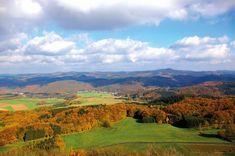
Many town dwellers - as well as a surprising number of people living in the countryside - fail to make any connection with the food they eat and the impact it has on the landscape.
The British countryside is a largely managed environment and its diversity directly relates to the many different crops that are produced by the country’s farmers and growers.
People need a diet that provides all the nutrients required to keep our bodies fit and healthy. Eating a single type of food exclusively doesn’t provide the balance that is the basis to healthy eating - and it hardly bares thinking about what the impact would be on the countryside if everyone ate the same food. Put simply, our health and our countryside benefit when we eat a wide diversity of foods. -
VIEWPOINTS
John Guest - The English Apple Man
Healthy food derived from fruit, salads and vegetables enhances the diversity and beauty of the countryside and helps to maintain the soil structure. Sheep and dairy farming add a charm to the visual impact, while regenerating the soil fertility and adding valuable proteins to our diet.
Jamie Weir - CPRE Protect Kent
Eating healthily is critical to the continued beauty of our countryside. If the public creates a demand for sustainably grown fruit and vegetables - and organically and naturally reared meat - it will ensure that more of our countryside remains unblighted by inappropriate man-made structures.
Dr Howard Lee - Hadlow College
We are all conscious of the need to eat healthily these days, but many people fail to do so due to low income and lifestyle issues. In many cities, fast foods are offered at competitive prices and are preferred by families for their convenience: the classic situation of ‘food poverty’.
By contrast, a well-balanced diet of fruit, vegetables, pulses and some meat is vitally important for long-term human health. The rural landscape will also benefit from such consumption. This is because farms with a ‘mixed’ (livestock and crops) management have the most viable future across most parts of Britain - except the uplands and other mountainous regions.
Dr Chris Atkinson - East Malling Research
Eating a balanced mixture of fruit, vegetables, starchy products and meat is key to human health with the promotion of initiatives like 5 A DAY encouraging healthier diets. This resurgence of understanding the benefits derived from eating seasonal and locally produced food fits well into consumer desires. At East Malling Research we are aware that differences in regional landscapes and resource availability, for example rainfall and water availability, will need to be exploited if we are to maximise sustainable yields and this will create regional differences in the UK food-production landscape.
Charles Tassell - Ex-chair, NFU Kent
Healthy eating encourages diverse cropping in our countryside, restoring the landscape patchwork. By consumers choosing locally produced, seasonal food, farmers are encouraged to produce wider ranges of crops. This helps to increase biodiversity because multi-cropping - involving spreading, sowing and harvesting operations - benefits wildlife.